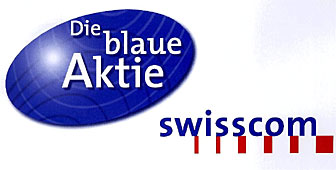
Flush Swisscom gives money back to shareholders

The country's biggest telecommunications operator, Swisscom, is using its huge cash surplus to buy back ten per cent of its share capital for up to SFr4.3 billion ($2.55 billion).
The former state monopoly, privatised in 1998, has a cash mountain due to the sale of assets and the low price it paid for its third generation mobile telecommunications licence.
It had a net cash position of SFr2.8 billion at the end of last September, compared with debts of SFr4.26 billion at the end of September 2000. The money is largely due to the sale of a 25 per cent stake in its domestic mobile phone operation to Vodaphone for SFR4.5 billion at the end of 2000 and the sale of real estate and other assets.
The Government, which currently holds a 65.5 per cent stake in the operator, says its stake will be worth at laest 61.7 per cent after the operation. By law, the state must keep a majority holding in Swisscom. The parliamentary finance commission gave the go-ahead for the state’s participation in the share buy-back provided the revenues of around SFr2.8 billion are used to cut the national debt.
Shareholder allocations
Under the plan, shareholders will be allocated one free put option per share. For every ten put options, shareholders will be entitled to sell one share to Swisscom at a price of SFr580. Alternatively, the options can be sold on the stock exchange during ten trading days.
The operator decided on the share buyback plan after failing to find a target for expansion in the European mobile telecommunications or data transmission sectors. It has decided not to make any strategic acquisitions despite reviewing more than 100 candidates.
“Since none of the analysed companies met all the criteria, Swisscom decided against an acquisition,” said a company statement. “Swisscom will continue to go for profitable growth in the future and to this end will continue to actively examine possibilities.”
Swisscom’s management has been extremely cautious in its plans for expansion, especially following the collapse of Swissair. The carrier’s failure was in large part due to a failed foreign expansion programme that saw it invest in loss-making European airlines.
Swisscom itself also had its fingers burned in recent years by buying into some Asian operators that have already been divested.
The company’s main foreign stake now is a 94 per cent holding in the German-based mobile services provider, Debitel.
swissinfo with agencies

In compliance with the JTI standards
More: SWI swissinfo.ch certified by the Journalism Trust Initiative















![The four-metre-long painting "Sonntag der Bergbauern" [Sunday of the Mountain Farmers, 1923-24/26] had to be removed by a crane from the German Chancellery in Berlin for the exhibition in Bern.](https://www.swissinfo.ch/content/wp-content/uploads/sites/13/2025/12/01_Pressebild_KirchnerxKirchner.jpg?ver=a45b19f3)













You can find an overview of ongoing debates with our journalists here . Please join us!
If you want to start a conversation about a topic raised in this article or want to report factual errors, email us at english@swissinfo.ch.